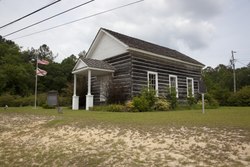McIntosh, Alabama
McIntosh, Alabama | |
|---|---|
 Andrews Chapel in McIntosh | |
 Location of McIntosh in Washington County, Alabama. | |
| Coordinates: 31°15′58″N 88°1′53″W / 31.26611°N 88.03139°W | |
| Country | United States |
| State | Alabama |
| County | Washington |
| Area | |
| • Total | 1.00 sq mi (2.58 km2) |
| • Land | 1.00 sq mi (2.58 km2) |
| • Water | 0.00 sq mi (0.00 km2) |
| Elevation | 49 ft (15 m) |
| Population (2020) | |
| • Total | 206 |
| • Density | 206.83/sq mi (79.85/km2) |
| Time zone | UTC-6 (Central Time (CT)) |
| • Summer (DST) | UTC-5 (CDT) |
| ZIP code | 36553 |
| Area code | 251 |
| FIPS code | 01-45472 |
| GNIS feature ID | 0152280 |
| Website | mcintoshal |
McIntosh, (originally known as McIntosh Bluff[2]), is a town located in Washington County, Alabama, United States along U.S. Route 43. It is 12+1⁄2 miles (20.1 km) south of Wagarville and 44 miles (71 km) north of Mobile. The population as of the 2020 U.S. Census was 206, down from 238 in 2010.
McIntosh is one of the most Native American towns in Alabama, with over half of the town's inhabitants reporting to be of Native descent in the 2020 census
The town and county have a high proportion of residents who are members of the MOWA Band of Choctaw Indians, a state-recognized tribe of people of the Muskogean-speaking language family. It has one site, Andrews Chapel, listed on the National Register of Historic Places.[3]
History
[edit]McIntosh was named for Captain John McIntosh, a British Army officer.[2] McIntosh had a river landing at McIntosh Bluff on the Tombigbee River.[4] The town was incorporated on April 7, 1970.[5] McIntosh is near the site of Aaron Burr's arrest in 1807 while the area was part of the Mississippi Territory. He was captured by U.S. Army Lt. Edmund P. Gaines in the town of Wakefield, a few miles to the north, and then confined to Fort Stoddert. A historic marker has been placed to document this event.[6]
Geography
[edit]McIntosh is located at 31°15'58" North, 88°1'53" West (31.265979, -88.031473).[7] According to the U.S. Census Bureau, the town has a total area of 1.0 square mile (2.6 km2), all land.
Demographics
[edit]| Census | Pop. | Note | %± |
|---|---|---|---|
| 1970 | 297 | — | |
| 1980 | 319 | 7.4% | |
| 1990 | 250 | −21.6% | |
| 2000 | 244 | −2.4% | |
| 2010 | 238 | −2.5% | |
| 2020 | 206 | −13.4% | |
| U.S. Decennial Census[8] 2013 Estimate[9] | |||
As of the census of 2000,[10] there were 244 people, 94 households and 62 families in the town. The population density was 243.9 inhabitants per square mile (94.2/km2). There were 98 housing units at an average density of 98.0 per square mile (37.8/km2). The racial makeup of the town was 55.23% Native American, 43.03% Black or African American, 1.33% White and 0.41% from two or more races. 0,41% of the population were Hispanic or Latino of any race.
There were 94 households, out of which 36.2% had children under the age of 18 living with them, 47.9% were married couples living together, 18.1% had a female householder with no husband present, and 33.0% were non-families. 30.9% of all households were made up of individuals, and 11.7% had someone living alone who was 65 years of age or older. The average household size was 2.60 and the average family size was 3.27.
In the town, the population was spread out, with 29.5% under the age of 18, 6.6% from 18 to 24, 24.6% from 25 to 44, 25.0% from 45 to 64, and 14.3% who were 65 years of age or older. The median age was 35 years. For every 100 females, there were 83.5 males. For every 100 females age 18 and over, there were 72.0 males.
The median income for a household in the town was $28,214, and the median income for a family was $39,167. Males had a median income of $31,429 versus $22,750 for females. The per capita income for the town was $14,023. 13.5% of the population and 10.0% of families were below the poverty line. Out of the total population, 22.2% of those under the age of 18 and 9.1% of those 65 and older were living below the poverty line.
Notable people
[edit]- George Troup, U.S. Senator of Georgia from 1816 until 1818 and from 1829 until 1833, and governor of Georgia from 1823 until 1827[11]
- Brok Weaver, mixed martial artist
- Greg Wells, former Major League Baseball player
References
[edit]- ^ "2020 U.S. Gazetteer Files". United States Census Bureau. Retrieved October 29, 2021.
- ^ a b Kaetz, James P. "McIntosh". Encyclopedia of Alabama. Retrieved September 21, 2023.
- ^ "National Register Information System". National Register of Historic Places. National Park Service. March 13, 2009.
- ^ "National Register of Historic Places Multiple Property Documentation Form". Department of the Interior. Retrieved September 19, 2023.
- ^ "Town of McIntosh, Alabama". mcintoshal.com.
- ^ "Alabama Historical Marker Program-Washington County". Archived from the original on February 22, 2013. Retrieved December 30, 2012.
- ^ "US Gazetteer files: 2010, 2000, and 1990". United States Census Bureau. February 12, 2011. Retrieved April 23, 2011.
- ^ "U.S. Decennial Census". Census.gov. Retrieved June 6, 2013.
- ^ "Annual Estimates of the Resident Population: April 1, 2010 to July 1, 2013". Retrieved June 3, 2014.
- ^ "U.S. Census website". United States Census Bureau. Retrieved January 31, 2008.
- ^ Saba, Natalie. "George Troup". New Georgia Encyclopedia. Retrieved September 21, 2023.

